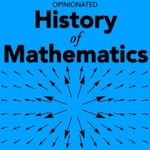Opinionated History of Mathematics – Details, episodes & analysis
Podcast details
Technical and general information from the podcast's RSS feed.

Opinionated History of Mathematics
Intellectual Mathematics
Frequency: 1 episode/59d. Total Eps: 40

Recent rankings
Latest chart positions across Apple Podcasts and Spotify rankings.
Apple Podcasts
🇨🇦 Canada - mathematics
14/08/2025#19🇬🇧 Great Britain - mathematics
14/08/2025#2🇩🇪 Germany - mathematics
14/08/2025#7🇺🇸 USA - mathematics
14/08/2025#3🇫🇷 France - mathematics
14/08/2025#17🇨🇦 Canada - mathematics
13/08/2025#15🇬🇧 Great Britain - mathematics
13/08/2025#3🇩🇪 Germany - mathematics
13/08/2025#16🇺🇸 USA - mathematics
13/08/2025#4🇫🇷 France - mathematics
13/08/2025#14
Spotify
No recent rankings available
Shared links between episodes and podcasts
Links found in episode descriptions and other podcasts that share them.
See allRSS feed quality and score
Technical evaluation of the podcast's RSS feed quality and structure.
See allScore global : 38%
Publication history
Monthly episode publishing history over the past years.
Did Copernicus steal ideas from Islamic astronomers?
mercredi 29 novembre 2023 • Duration 01:27:04
Operational Einstein: constructivist principles of special relativity
dimanche 23 juillet 2023 • Duration 01:16:38
Why construct?
mercredi 20 janvier 2021 • Duration 01:18:01
Created equal: Euclid’s Postulates 1-4
jeudi 10 décembre 2020 • Duration 41:00
That which has no part: Euclid’s definitions
mardi 3 novembre 2020 • Duration 43:33
What makes a good axiom?
dimanche 4 octobre 2020 • Duration 35:21
Consequentia mirabilis: the dream of reduction to logic
mardi 8 septembre 2020 • Duration 35:50
Read Euclid backwards: history and purpose of Pythagorean Theorem
jeudi 30 juillet 2020 • Duration 41:37
Singing Euclid: the oral character of Greek geometry
dimanche 21 juin 2020 • Duration 40:10
First proofs: Thales and the beginnings of geometry
vendredi 15 mai 2020 • Duration 42:27